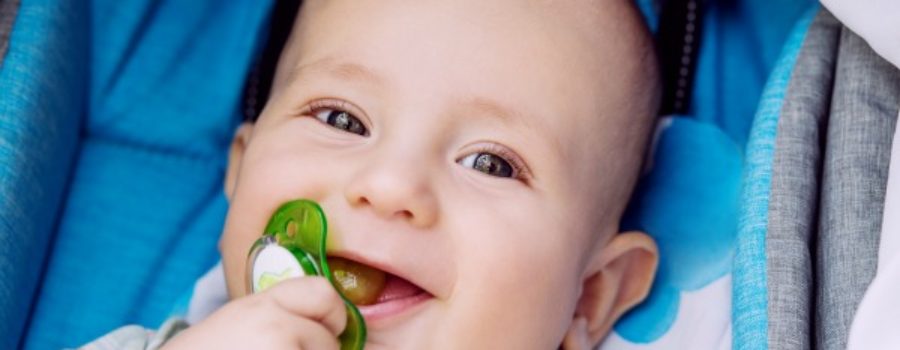Is a pacifier really bad for my baby’s teeth or is the hype much ado about nothing?
Whether you call it a paci, a dummy, a soother or — my personal favourite — a mute button, we’re talking about pacifiers. The little rubber contraptions that babies suck on to soothe themselves. Babies have a reflexive need to suck, whether or not they are actually eating, and a pacifier can answer that need in the absence of dinner, helping the baby to relax. They’re not a new concept:
By the time Christian W. Meinecke applied for a patent for “a new and original Design for a Baby Comforter” in 1901, people had been giving babies soothing objects to suck on for centuries: knotted rags dipped in water or honey, wooden beads or “gum sticks” made of stone, bone or coral. But nothing would ever be quite as popular as the pacifier. (source: http://www.nytimes.com/2014/06/22/magazine/who-made-that-pacifier.html?_r=0)
More recent research, however, indicates that while pacifiers do indeed provide some welcome relief for parents, and for babies, keeping it around too long comes at a price.
What is the potential damage from pacifier use?
Early usage in the first few years of life is not a problem: most kids will likely not experience any damage to their mouth or teeth. The problem stems from the habit that is formed of having the pacifier and the resulting prolonged and frequent use, even after the child begins losing their baby teeth. It can impact the development of adult teeth: they could end up coming in misaligned. For example:
- The top front teeth could slant out
- The bottom front teeth could tilt in
- The upper and lower jaws could be misaligned
- The roof of the mouth could be narrower side to side
Further, some parents have gotten into the habit of dipping pacifiers in honey or sugar water, creating a perfect storm for tooth decay. We can’t stress enough that you should avoid this habit at all costs!
How can I help my child to stop using a pacifier?
Many kids will drop the habit on their own by age 4 but if they don’t, there are some ways you can help them:
- For young children (under 2), try using other methods of soothing them including rocking or playing soft music at bedtime.
- For older children, focus their attention on another ‘lovey’ – something that they can self-soothe with, so they will no longer need the pacifier.
- Some parents have had luck having a special ceremony to bury or throw away the pacifier – or consider allowing them to trade it for a new toy or book that they really would like to have.
If you are having trouble getting your child to drop the pacifier habit, let your dentist know when you go in for a cleaning. They can monitor the progress of adult teeth and the jaw more closely, to ensure that everything is developing normally.
With Valentine’s Day coming up, remember to brush after eating all that chocolate. Better yet, ask for roses.
Whether your child has a pacifier habit, make regular visits to your family dentist a part of your children’s oral health habits. Orion Dental specializes in children’s dentistry, and with offices conveniently located in Milton and Scarborough we’re never too far away! Call us today to book an appointment for you and your family!








